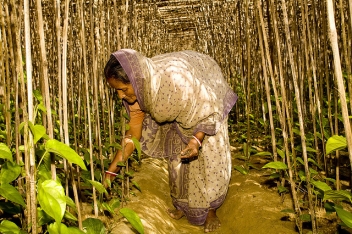 The current edition of the International Monetary Fund’s (IMF) Finance and Development is looking at the implications of population ageing.
The current edition of the International Monetary Fund’s (IMF) Finance and Development is looking at the implications of population ageing.
The video accompanying the report makes strong recommendations for steps to consider, which include “integrating ageing into all aspects of development” and “involving the elderly more in major policy decisions”. [also…”Fundamental reforms in existing pension systems” and “Making healthcare affordable to all”]
The IMF’s recognition of the significance of population ageing for development is a positive sign. It comes in the context of minimal recognition by many international organisations, governments and donors of the need to begin addressing the demographic shift which is already affecting many developing countries and development issues.
This was vividly highlighted, as we recently reported, in the “Political Declaration on HIV/AIDS” emerging from the UN High Level Meeting on HIV in early June. Despite the ageing of HIV that is occurring as a result of people living longer with the virus due to increased access to treatment, and the significant challenges that result, the declaration failed to recognise the needs of older people.
Discussing the implications of global ageing
The articles in Finance and Development discuss the range of implications of population ageing including the cost of healthcare, and there is a particular focus on the cost of pension systems. The analysis is generally measured and evidence based, and there is an effort to highlight the positive impacts of ageing.
Nevertheless, there is still a tendency to associate ageing populations with economic doom. As one of the articles puts it, global ageing “could throw into question the ability of many countries to provide a decent standard of living for the old without imposing a crushing burden on the young”.
When it comes to developing countries, certain different trends need to be highlighted. First, the assumption made by Lee and Mason that “most elderly people are no longer part of the labour force” is far from true in many developing countries.
Older people are present in the global workforce
The United Nations (UN) estimates that in 30 countries, at least half of those aged 65 and over continue to work. In the Central African Republic, Malawi, Mozambique and Tanzania, more than 80% of men over 65 continue to work. In Malawi, 96% of older men and 86% of women over 60 work, compared with 24% of men and 12% of women in the UK.
It is likely that the actual numbers of older people working are much higher, as statistics do not take into account all of the work that older people do, particularly the ‘hidden’ work carried out by older women (domestic work, and caring for other family members).
We also shouldn’t ignore the hidden role that older people play in households, such as the many grandmothers who care for children enabling their daughters to go out and work and in the absence of parents who have died as a result of AIDS.
Pension systems need strengthening
Secondly, there needs to be a clear recognition that – while some developed economies may need to look at reducing spending on pensions – the vast majority of older people in across the globe receive no pension at all. For developing countries, there is a need to look at how strengthening pension systems
This is recognised in the article by Howe and Jackson which highlights that the high priority for countries such as China and Mexico is to “strengthen poverty floors”. In fact, both countries have been in the process of doing this through social – non-contributory – pensions to certain sectors of the older population. This follows the lessons of countries such as Bolivia, Brazil, South Africa and Thailand which have implemented social pensions as a progressive and affordable ways to address the poverty of older people and their families.
The debate about how developing countries can address the challenges of population ageing is one that needs to continue. An essential step in this direction would be for the wider international community to recognise the demographic transformation which the world is facing.
Read more about our work on our social pensions microsite, Pension watch
